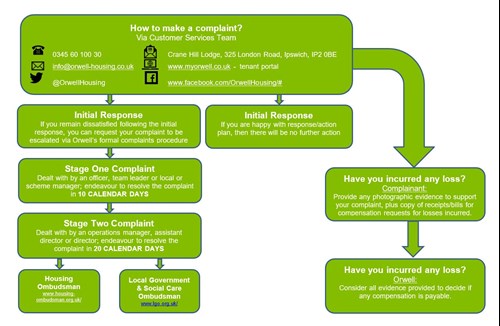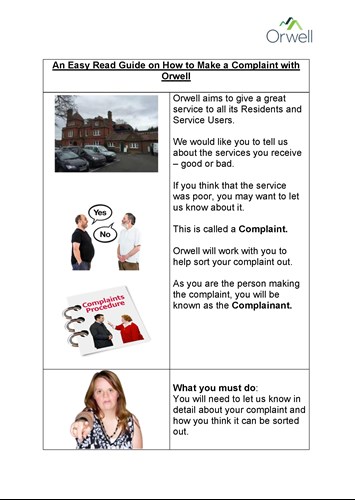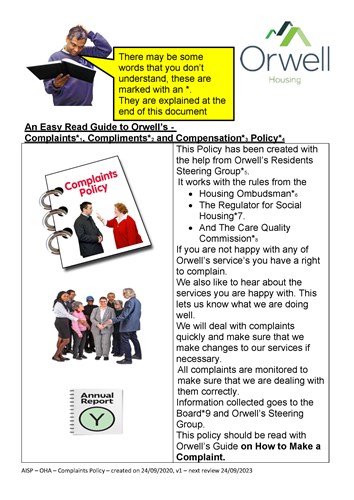Policy statement
Purpose
Orwell sincerely welcomes complaints and compliments from anybody who has received a service from Orwell. We welcome and value this feedback because, without it, we would not be able to learn from and correct our mistakes; similarly, it is good to know when we have got the service right.
If you want to make a complaint, please fill out our complaints form here.
-
Legal Obligations
The policy will comply with the Localism Act (2011), Housing Act (1996 – schedule 2), General Data Protection Act (GDPR) (2018), Equality Act (2010), Housing Ombudsman’s Complaint Handling Code, the RSH Tenant Involvement and Empowerment Standard and the Health & Social Care Act (2008) (Regulated Activities) Regulations 2014: Regulation 16.
It is important that customers understand and appreciate that Orwell will treat all complaints in the upmost confidence, complying with all aspects of the General Data Protection Act (2018).
This policy is compliant with the requirements of our Regulators, specifically the Care Quality Commission and both the Housing Ombudsman’s Service Complaints Handling Code and the Regulator for Social Housing’s Tenant Involvement and Empowerment Standard.
-
Orwell’s Commitment
We will ensure complaints are handled quickly and efficiently, making sure any changes to the service required are put in place.
All complaints will be monitored to ensure that we are being fair, putting things right and learning from outcomes. An annual report produced by our lead officer for complaints will be shared with both Orwell’s Residents’ Group and the Board.
All complaints will be conducted in an impartial manner. The complaints handler will:
- Deal with complaints on their own merit.
- Act independently and with an open mind.
- Take measures to address any actual or perceived conflicts of interest.
- Consider all evidence and information carefully.
- Keep the complaint confidential as far as possible with information only disclosed to investigate the matter.
This policy should be read in conjunction with Orwell’s Duty of Candour policy which applies to Health & Social Care providers registered with the Care Quality Commission. The Duty of Candour expects organisations to operate within a culture of openness, transparency and to continually improve services and improve safety, listening and learning.
-
Complaints Procedure
A complaint is defined as an expression of dissatisfaction, however made, about the standard of service, actions or lack of action by the organisation, its own staff or those acting on our behalf, affecting an individual, resident or group of residents.
A customer does not have to use the word “complaint” in order for it to be treated as such. A complaint made by a third party or representative on behalf of a customer will still be handled in accordance with this Policy.
A complaint about anti-social behaviour from an Orwell resident would not be regarded as a complaint, unless the complaint is about Orwell’s handling of the anti-social behaviour service.
Orwell recognises that not everybody is willing or able to make a complaint: some people may just be wishing to clarify their understanding of a matter or be listened to. If a customer does not receive a satisfactory answer to a query, the staff member concerned should escalate the matter as a complaint, and customers have the right to do that in any case.
-
Who can make a complaint?
Anyone can make a complaint about Orwell’s service. We will accept the complaint unless there is a valid reason not to do so (please refer to section 8 on exclusions below). Details on how to complain are set out below with further details contained within Orwell’s Guidance on How to Make a Complaint.
Complaints that are submitted via a third party or representative, such as an MP, will still be handled in line with our complaints policy.
-
How to make a complaint?
Complaints should be made to our Complaints Officer who will then decide who is the best person to handle the complaint. The complaint will then be logged, referred and monitored for quality assurance purposes. Complaints can be sent to the Customer Services Team by email, in writing, by telephone, in person, through Orwell’s website or social media.
Should a negative comment be received on social media, we will respond with a direct/private message to request further information and to advise the customer of our complaints procedure.
If Orwell’s normal response times for dealing with a complainant are likely to adversely affect the complainant due to their health or disability, then we will make reasonable endeavours to deal with and respond to the complaint more quickly.


-
How the complaint will be handled?
Orwell has a simple and efficient complaints process involving just two stages. When a complaint is made, we will acknowledge and log stage one of the complaints procedure within five working days of receipt of complaint.
A stage one complaint will be dealt with at an officer / front-line team leader or local or scheme manager-level, who will endeavour to resolve the complaint in ten working days.
A stage two complaint will be dealt with at operations manager, assistant director or director level, who will endeavour to resolve the complaint in twenty working days. Stage two will not be instigated unless stage one has been completed.
If a complainant raises additional complaints during the investigation, these will be incorporated into the stage one response if they are relevant, and the stage one response has not been issued. Where the additional complaints are not relevant, or the stage one response has been issued, or it would unreasonably delay the response, the complaint will be logged as a new complaint.
Orwell endeavors to keep complainants updated and to respond within the timescales set out within this policy. If, for whatever reason, Orwell is unable to resolve the complaint in the above timeframes, we will contact the complainant in writing to set out what we are intending to do to resolve the complaint, and by when, with new timescales for response. We will seek the agreement of the complainant to this plan. If the extended timeframes set out are not adhered to, the customer is then able to escalate the complaint and will be provided with the Ombudsman’s contact details.
In responding to the complainant, the person dealing with the matter will provide a clear explanation on how the complaint can be escalated to stage two of the procedure if the customer remains dissatisfied, and will set out the timeframe for this, which is within 28 days from receipt of the concluding letter.
-
Exclusions
We will not normally accept complaints or offer escalation to the next stage of our internal complaints’ procedure in the following circumstances:
- Where the problem is a recurring issue, and we consider we have previously resolved the matter.
- Where a complainant is not engaging with us and failing to provide relevant information relating to their complaint.
- Where legal proceedings have started.
- Where the complainant is behaving unreasonably.
If we decide not to accept a complaint, for any of the above or any other reason, we will explain why in detail, and the customer will have the right to challenge this decision by bringing the matter to the relevant Ombudsman.
-
Closing complaints
A complaint will be considered closed when Orwell has written to the complainant outlining what we have done or propose to do to resolve the complaint. Orwell will give the customer a further opportunity at this stage to provide feedback to Orwell, or to escalate the complaint accordingly.
When writing to confirm a complaint is being closed, we will clarify:
- The complaint stage
- The definition of the complaint
- The decision on the complaint
- The reasons for any decisions made
- The detail of any remedy offered to put things right
- Acknowledgement of any failures
- Details of any outstanding actions taken or still required to put things right
- Anything we have learnt from the complaint
- Details of how to escalate the complaint
Any remedy offered to resolve a complaint will set out clear timescales for actions and will be followed through to completion.
We will address all points raised in the complaint and provide clear reasons for any decisions, referencing the relevant policy, law and good practice where appropriate.
Any outstanding actions following closure of the complaint will be tracked and monitored until completed.
-
What happens after stage two of our complaints procedure?
If a customer remains dissatisfied with the response at stage two of the procedure, they are able to refer their complaint to the Housing Ombudsman or Local Authority Ombudsman. The Ombudsman’s contact details will be provided in the concluding letter to the complainant.
-
Complaint taking too long to resolve
If a customer considers that their complaint is taking too long to resolve we will offer an escalation of the complaints procedure and we will provide them with the details of the Housing Ombudsman.
If the complaint is about Orwell’s Support & Care Service, the customer should exhaust Orwell’s internal complaints procedure first. If the complaint is not resolved to the customer’s satisfaction, they can refer it to the relevant County Council, Local Authority or the Care Quality Commission as appropriate. Orwell staff will be able to advise customers on the appropriate route for their complaint.
Make a complaint -
Vexatious complaints
If a customer displays behaviour which Orwell consider to be unreasonable or are making unreasonable demands, we will refer to our unacceptable behaviour and unreasonable demands policy and procedure. This provides guidance on what types of behaviour is vexatious and advice colleagues of what action to take in this situation.
-
Representation and support
If customers are not comfortable or confident making a complaint, we will signpost them to other organisations, such as Citizens Advice and any other appropriate agencies who may be able to advise and provide support with making a complaint.
If a customer does not have the mental capacity to make a complaint, we will accept complaints from an advocate, an Independent Mental Capacity Advocate (IMCA) or Legal Representative.
-
Equality and fairness
We have produced an accessible guide to our Complaints Policy and our Guidance on How to Make a Complaint, which is available to view on our website.
We aim to treat all complainants fairly and equitably, in a non-discriminatory manner and without prejudice. We seek to embed equality, fairness, inclusivity, diversity, and respect in our complaints handling policy and processes.
We recognise that some of Orwell’s customers may wish to be represented by a Power of Attorney or advocate. Interpreting services can also be provided on request.
We recognise that we may need to make changes to our normal complaint handling procedure in order to meet an individual’s specific needs. We will consider all requests for ‘reasonable adjustments’ to our procedures under the Equality Act 2010.
-
Monitoring and learning from complaints
All stage 1, stage 2 and complaints made to Housing Ombudsman Service, or the Care Quality Commission (CQC) will be monitored by Orwell’s lead officer for complaints.
A report giving an overview of complaints received and learning from them will be taken to the Customer Insight Committee on a quarterly basis.
A report containing details of complaints received will be published annually and made available to Orwell’s Residents’ Group and Orwell’s Board.
Quarterly, the Complaints Handling Assessment Team (CHAT) part of Orwell Residents’ Group, will scrutinise our complaints, compliments, and compensation service.
28 days following the closure of a complaint, a customer satisfaction survey is sent to all customers who have logged a complaint. We will review any feedback to help us to learn from the complaint and contact customers that remain dissatisfied to ensure they are aware of how to pursue their complaint if they wish to.
-
Compliments
Any compliment received should be passed onto our Customer Services Team who will ensure that relevant staff member(s) receive(s) it. The team will also record all compliments and include these in their regular reporting to Orwell Residents’ Group, Customer Insight Committee and the Board.
-
Compensation
When considering offers of compensation, we will refer to our Compensation Policy & Procedure.
-
Self-assessment
We will self-assess our performance against the Housing Ombudsman’s Complaint Handling Code and publish this assessment on an annual basis. This can be found on our website. The self-assessment will be made available to, and reviewed by, the Customer Insight Committee and the Board.
Orwell is committed to being compliant with the Housing Ombudsman Complaint Handling Code.
The purpose of this self-assessment is to identify where we are already compliant and identify any areas where we can make improvements. All questions were provided by the Housing Ombudsman.
The forms can be found below.





